Covid Inquiry latest: Boris Johnson called for 'bigger fines' for lockdown rule-breakers
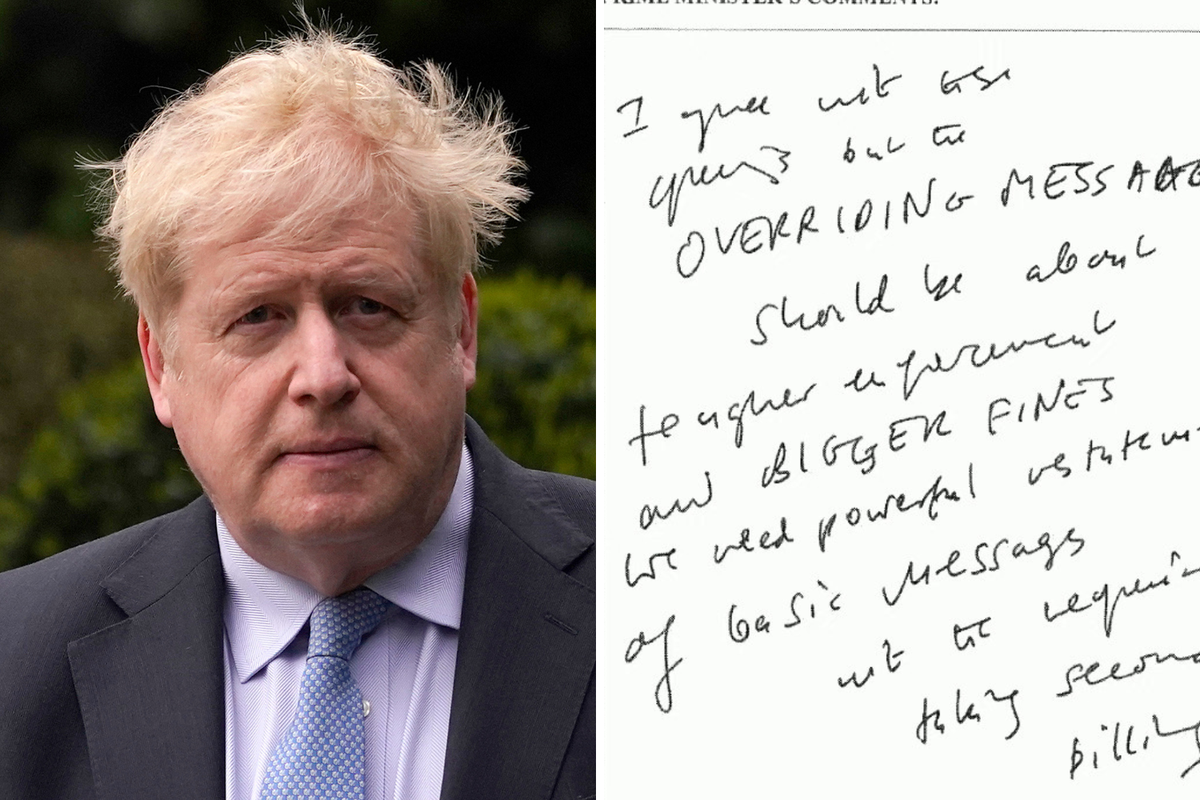
Boris Johnson demanded an emphasis on “bigger fines” as he unwound lockdown restrictions in the summer of 2020, the Covid Inquiry has heard.
In a handwritten note shown to the inquiry on Thursday afternoon, the then-prime minister wrote: “I agree with the openings but the OVERRIDING MESSAGE should be about tougher enforcement and BIGGER FINES.”
Lead counsel to the inquiry Hugo Keith KC asked former home secretary Dame Priti Patel to put aside the “crushing irony” of Mr Johnson’s note as he asked her about putting the message into practice.
Mr Johnson and his wife, Carrie Johnson, themselves received £50 fines for a now-infamous surprise birthday party held for him in Downing Street on June 19, 2020.
Dame Priti went on to say the hefty £10,000 fine introduced for breaches of coronavirus regulations was not proportionate.
Questioned by Mr Keith on whether the flat fine of £10,000 introduced in August 2020 was proportionate, Dame Priti said: “It was very high.”
Pressed again on whether it was proportionate, the former home secretary said: “The answer is no.”
Patel: I had to remind colleagues that police are independent
16:35 , Daniel Keane
Former home secretary Dame Priti Patel said she had to remind ministerial colleagues of the operational independence of the police.
She told the Covid Inquiry: “Throughout the pandemic I felt I spent a great deal of time reminding my colleagues of the role of policing … operational independence, and that we as politicians are not there to dictate directly to the police as to when to arrest people or enforce the law.”
'All I've seen is footage of argy bargy', Johnson said of Everard vigil
16:21 , Daniel Keane
WhatsApp messages from March 2021 show former prime minister Boris Johnson felt he could not criticise police following the Sarah Everard vigil “when all I have seen is footage of some argy bargy without knowing what happened”.
Minister of State at the Cabinet Office Lord David Frost’s message in the exchange was shown to the inquiry first, in which he said: “Police are in an impossible position in many ways because of the impossibility of enforcing current rules.
“We certainly should not throw them under the bus.”
Mr Johnson eventually gave his thoughts on how to handle the fallout from the vigil, saying: “Unless anyone strongly disagrees, I think it should be Priti who tweets tonight.”
The then deputy director of communications Jack Doyle responded: “Agree. She tweeted in time for the ten o’clock news and I think we got the tone right.”
Mr Johnson replied: “Feels odd to weigh in as PM and bash the cops when all I have seen is footage of some argy bargy without knowing what happened.
“Think Starmer looks a bit opportunistic and anti-police.
“But no doubt the female MPs feeling strongly.”
Police 'struck right balance' at Everard vigil, says Patel
16:04 , Daniel Keane
Former home secretary Dame Priti Patel has told the UK Covid-19 Inquiry she believed police struck the right balance between protest and freedom of expression, and enforcing coronavirus regulations, despite their approach appearing “uncomfortable”.
Asked whether she believed the police’s approach struck the balance, Dame Priti said: “I do. At the time it probably felt uncomfortable – where we had lockdowns, for example, and people’s movements were being restricted and the public discourse would be ‘why are these protests happening?’
“Of course, those are difficult challenges – it feels uncomfortable.”
The former home secretary referred in particular to Black Lives Matter protests and spoke about one demonstration which “turned particularly violent”.
She continued: “So, striking the balance – difficult. I think at the time it felt very uncomfortable.”
Dame Priti 'dismayed' by police handling of Sarah Everard vigil
15:00 , Lydia Chantler-Hicks
Dame Priti has said she was “dismayed” with how police handled a vigil to remember Sarah Everard during the Covid-19 pandemic.
The former home secretary told the inquiry: “I saw the news that night and just felt that that was totally inappropriate policing.
“So, inevitably, I had to raise that with the commissioner of the Metropolitan Police and then a lot of other work took place thereafter.”
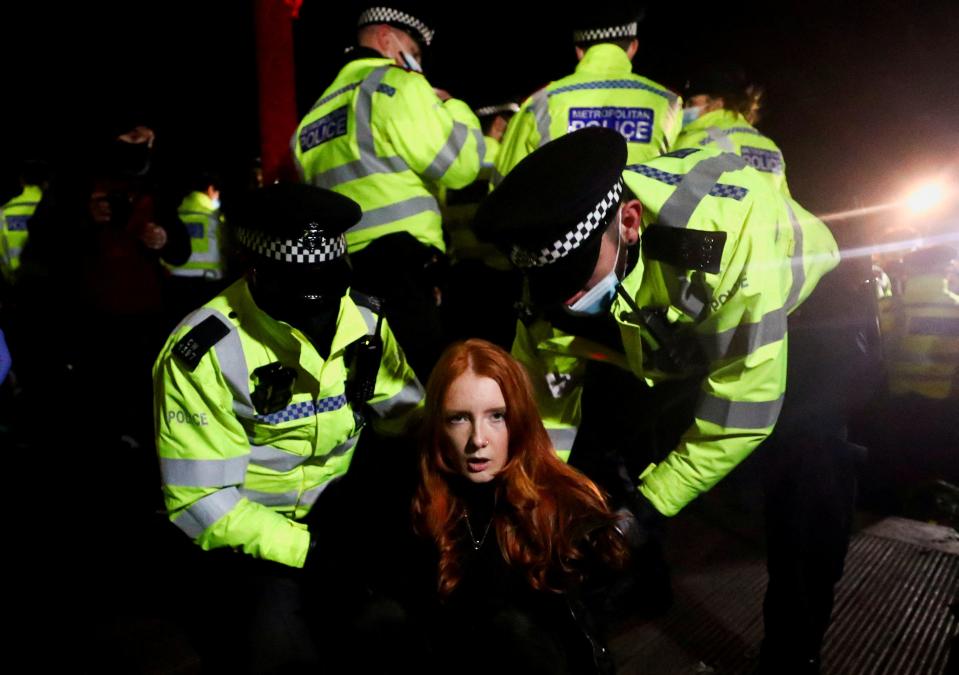
Two women arrested at the vigil for murdered south Londoner Sarah Everard won an apology and substantial damages from the Metropolitan Police earlier this year.
Dania Al-Obeid and Patsy Stevenson were both detained by police officers at the event on Clapham Common in March 2021, 10 days after Ms Everard had been kidnapped, raped, and murdered by serving PC Wayne Couzens.
Scotland Yard faced nationwide anger at its handling of the vigil as women including Ms Stevenson were pictured being manhandled and pinned to the ground by police, just as the force was faced fierce criticism over female safety on the streets of London.
£10,000 Covid fines 'very high' says Dame Priti
14:55 , Lydia Chantler-Hicks
Dame Priti said the £10,000 fine introduced for breaches of coronavirus regulations was not proportionate.
Questioned by Hugo Keith KC on whether the flat fine of £10,000 introduced in August 2020 was proportionate, Dame Priti said: “It was very high.”
Pressed again on whether it was proportionate, the former home secretary said: “The answer is no.”
Boris Johnson demanded focus on BIGGER FINES in handwritten note as lockdown was lifted
14:55 , Lydia Chantler-Hicks
Boris Johnson demanded that “bigger fines” be emphasised as he unwound lockdown restrictions in the summer of 2020.
In handwritten comments shown to the Covid inquiry, the then-prime minister wrote: “I agree with the openings but the OVERRIDING MESSAGE should be about tougher enforcement and BIGGER FINES.”
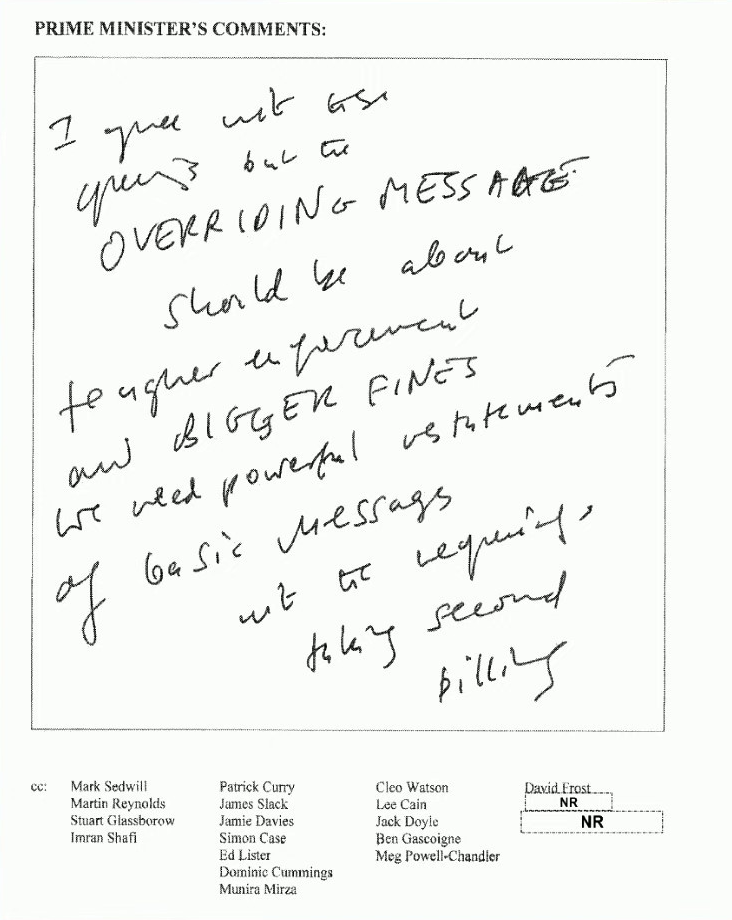
Lead counsel to the inquiry Hugo Keith KC asked former home secretary Dame Priti Patel to put aside the “crushing irony” of Mr Johnson’s note as he asked her about putting the message into practice.
Process of introducing new Covid legislation 'suboptimal at every single level', says Priti Patel
14:45 , Lydia Chantler-Hicks
Dame Priti has claimed the Home Office pushed back against the Department for Health and Social Care (DHSC) when they wanted to introduce 11th-hour coronavirus regulations, describing the process as “sub-optimal”.
Counsel to the inquiry Hugo Keith KC told Dame Priti the home secretary is a “very important beast in the jungle”, adding: “When the DHSC presented at the 11th hour another set of regulations, you must have screamed at them and said ‘you cannot do this again. This is unacceptable. These are matters of criminal law, these are matters of regulating the populace’?”
Dame Priti responded: “And we did.”
Asked what happened after pushing back against DHSC, the former home secretary said: “They would proceed.
“The Department for Health and Social Care would say ‘we need these regulatory changes’ and they would go ahead with it.”
Dame Priti continued: “It was sub-optimal at every single level."
Dame Priti: I'm not sure my colleagues thanked me for my work on safeguarding children
14:35 , Lydia Chantler-Hicks
Dame Priti has told the inquiry she is "not sure colleagues in government thanked me” for her work on safeguarding children.
Questioned on whether children and abuse victims were considered as part of debates concerning protecting vulnerable people during lockdown in March 2020, she said: “I can’t recall at that particular time - I cannot recall whether or not it was, but I do know that in terms of pressing for a wider definition of vulnerabilities and vulnerable people, I do know children came into it.
“The reason, as I’ve already touched on, is partly because of the work that I was pressing across government.
“I’m not sure my colleagues in government thanked me at the time, particularly around children, county lines, missing children. It’s a major part of our work in the Home Office.”
Dame Priti stands by steps taken to protect vulnerable people
14:29 , Bill Mcloughlin
Questioning Dame Priti, Hugo Keith KC, asked if the Home Office helped to reduce the "scourge of violence" seen across the UK at the time.
"They were the right steps to deploy," she says. "Even in the early days of the pandemic... we knew there would be a surge in demand for people seeking help and support."
Hearing breaks for lunch
13:13 , Lydia Chantler-Hicks
The inquiry has broken for lunch. The hearing is due to resume at 1.50pm.
Dame Priti says UK lacked 'technical capability' when pandemic hit
13:12 , Lydia Chantler-Hicks
Former home secretary Dame Priti Patel said that early in the pandemic there was no ability to prevent coronavirus arriving in the UK through the borders.
Discussing February and March 2020, lead counsel to the inquiry Hugo Keith KC said: “There was a distinct absence of practical capability to be able to restrict the infection through the border and secondly there was no sophisticated or effective system already thought about, drawn up and ready to be put into place when the virus attacked.”
Dame Priti replied: “I think that’s absolutely correct and, with that, no technical capability.
“At that stage the skills and capabilities simply weren’t there.”
'It was a fraught time' says Dame Priti regarding border control decisions
13:09 , Lydia Chantler-Hicks
Counsel to the Inquiry Hugo Keith KC described borer control as "undoubtedly a divisive issue", adding that during the pandemic it became "not just a political but a public health matter as well".
"It was a fraught time," said Dame Priti. "Our hands I think were effectively forced really, because of Wuhan what was happening in China.
"That led to a series of measures...around borers, visas, etc."
Mr Keith asked if it was the case that there were no step-by-step plans in place for the borders "in the event there is a viral pandemic identified offshore, and a clear indication it's coming [to the UK]".
Dame Priti responded: "I do think that's fair."
Dame Priti defends Home Office's communication with police during pandemic
12:50 , Lydia Chantler-Hicks
Dame Priti Patel has said she feels the Home Office "led...a very structured way of working with law enforcement", during the pandemic.
Her comments come after former police chief Martin Hewitt criticised the government's handling of the crisis earlier this morning, and its communication with both the police and public.Dame Priti admitted the government was "learning all the time" during the pandemic.
"Policing changed, but there were still law enforcement operations taking place," she said.
"I feel the Home Office led a very significant but actually a very structured way of working with law enforcement."
Priti Patel begins evidence
12:40 , Lydia Chantler-Hicks
Former home secretary Prit Patel is now giving evidence.
People travelled 'hundreds of miles' to visit beauty spots in pandemic, says ex-policing chief
12:14 , Lydia Chantler-Hicks
Disparity in regulations in different parts of the UK and people travelling to beauty spots put pressure on policing, Mr Hewitt has told the inquiry.
He said people were “travelling in some cases hundreds of miles” to go to beautiful parts of the UK, making locals “quite angry” about “lots of people from other parts of the country coming into those communities when they are they are abiding by all the rules”.
“People’s preparedness to comply is eroded when [they] think that 'the other person over there is having an easier time than me'.
“And this particularly became relevant when we started to get local lockdowns and and in some places where you would have literally on opposite sides of the road different regulations for people.
“And that puts a pressure on policing.”
Ex-police chief says policing pandemic protests was 'great challenge'
11:59 , Lydia Chantler-Hicks
The top police chief during the pandemic had “very strong words” with the Government over how to police protests at the time, the UK Covid-19 Inquiry has heard.
Martin Hewitt, the former chairman of the National Police Chiefs’ Council, said protests presented a “great challenge” for forces.
“There was a confusion around which of the competing legislations took priority,” he said.
“It’s important for people to understand how that felt for police officers when we are in a pandemic where we are talking about the requirement for people to remain distanced, and then are being told to go and police a protest.
“I used very strong words behind closed doors in discussion with the Home Office and the Home Secretary at the time in relation to the situation.”
Law that allowed police to make people take tests slammed as 'bad'
11:35 , Lydia Chantler-Hicks
Covid inquiry chairwoman Baroness Heather Hallett has criticised “bad” coronavirus legislation that gave police the powers to compel people to take tests.
She said: “The power to direct a test..,that’s an extraordinary power to enact, and I shouldn’t criticise our elected representatives but I can’t see the purpose. I see an awful lot of uncertainties, reasonable grounds, whether it’s unpractical, having to have a public health officer.
"And there are so many reasons why that’s a bad piece of legislation.
“Again I shouldn’t criticise but I am going to.
“It’s something we need to get into whether, or when, we have another pandemic we have on the books ready to go legislation that’s better than this.”
Martin Hewitt, the former chairman of the National Police Chiefs’ Council, said the powers were never used but agreed with the chairwoman.
“How on earth one forms a reasonable ground to suggest that somebody has or may be infected with a virus you can’t see seems to me quite a challenge in a practical sense,” he said.
Government communication of guidelines and laws 'incredibly confusing' to public, says ex-policing chief
11:14 , Lydia Chantler-Hicks
Mr Hewitt has criticised the government's communication of Covid rules to the public during the pandemic, describing its messaging as "incredibly confusing".
He described his frustration at seeing ministers on morning media rounds "refer[ring] to guidance as if it was reuglation or vice versa".
He said he would then have to make his own media appearances, explaining what was illegal and what was simply discouraged.
"It was incredibly unhelpful...for members of the public to understand," he said of the government's messaging.
He added that he believed the majority of the public "didn't want to break the rules", but that the rules themselves were "incredibly confusing to understand".
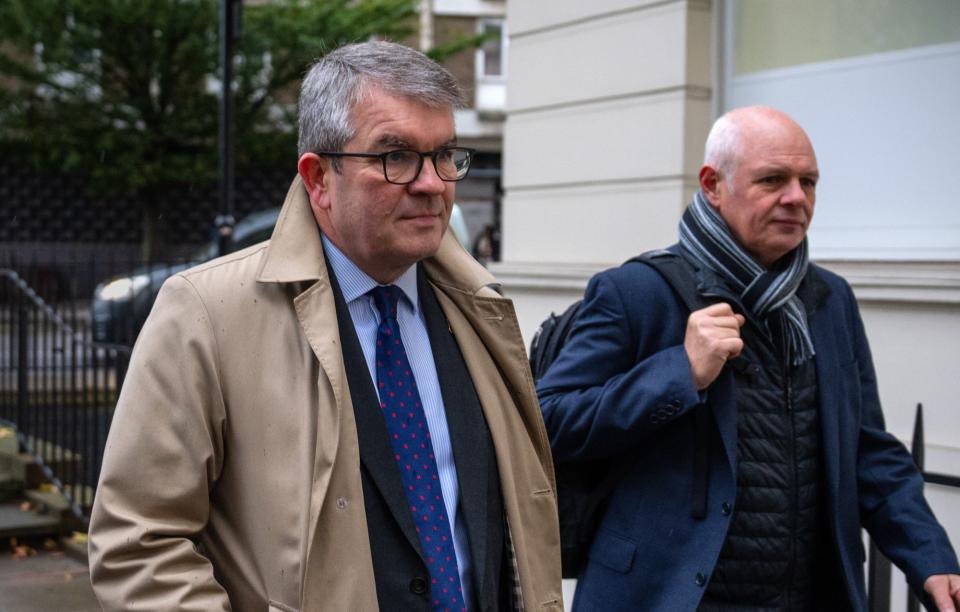
Ex-NPCC chief says new legislation came through too late to enforce
11:10 , Lydia Chantler-Hicks
Mr Hewitt has said that as legislation was frequently amended as the government scrambled to respond to the Covid-19 pandemic, "more should have been done" to keep police and the Home Office informed of the changes.
Recalling a specific case, he said: "There was a regulation that was going to change at one minute past midnight on one day...we receive the signed-off legislation at 11.45pm, so we had precisely 16 minutes."
He said he was forced to tell the then-Home Secretary "we were not going to be enforcing that legislation on that day, and that it would probably take us 24-36 hours to ensure that police officers out ther knew what they had to do".
He said that despite this, politicians would be on media rounds the next morning saying the legislation had come into effect, when it had not.
"It was unfair to put the officers in a position where they didn't understand precisely what they were meant to be doing," he said.
Policing during the pandemic wasn't just about issuing fines, says ex-NPCC chief
10:47 , Lydia Chantler-Hicks
Mr Hewitt has expressed frustration at the fact that when discussing the "level of enforcement" of Covid rules by police, many jump straight to the number of fines (fixed penalty notices) that were issued to rule-breakers.
He stressed many, many more engagements police had with the public ended before that stage, with police explaining the rules or encouraging people to return home.
"What we can't measure are the hundreds of thousands, if not millions of engagements that happened that ended [before fines had to be issued]," he said.
Mr Hewitt has also told how the NPCC launched 'Operation Talla' during the pandemic, aimed at distributing clear guidance to local police officers, to help them understand Covid guidelines and how to operate.
Former NPCC chief explains challenges policing faced
10:24 , Lydia Chantler-Hicks
Former chair of the National Police Chiefs’ Council (NPCC) Martin Hewitt is summing up the challenges Covid-19 posed to policing.
He explains the NPCC - of which he was chair throughout the pandemic - is responsible for helping coordinate national police activity, between individual forces which have operational independence.
In an extract of his witness statement shown to the hearing, he described "public health policing" as "largely uncharted territory" when the pandemic hit.
"This unprecedented situation called for an unprecedented response," he said in the statement.
The hearing has begun
10:03 , Lydia Chantler-Hicks
Today's hearing is now beginning. Up first giving evidence is Martin Hewitt QPM, former chairman of the National Police Chiefs' Council.
He will then be followed by Dame Priti.
Former chair of National Police Chiefs' Council pictured arriving
09:51 , Lydia Chantler-Hicks
Martin Hewitt, the former chairman of the National Police Chief's Council, has been pictured arriving at the hearing.
He is due to speak first today, followed by former home secretary Dame Priti.

Former home secretary likely to be quizzed on 'heavy handled' policing of lockdowns
09:39 , Lydia Chantler-Hicks
Former home secretary Dame Priti Patel is likely to be quizzed today on her approach to controlling the border and “heavy handed” policing of lockdown rules.
Dame Priti lobbied for stricter border controls in the early stages of the pandemic in an attempt to prevent the virus reaching the UK, but was overruled.
As home secretary, she defended the way police enforced lockdown measures, despite criticism of their approach.
She said she would “call the police” if she saw her neighbours flouting the rules and backed “strong enforcement”.
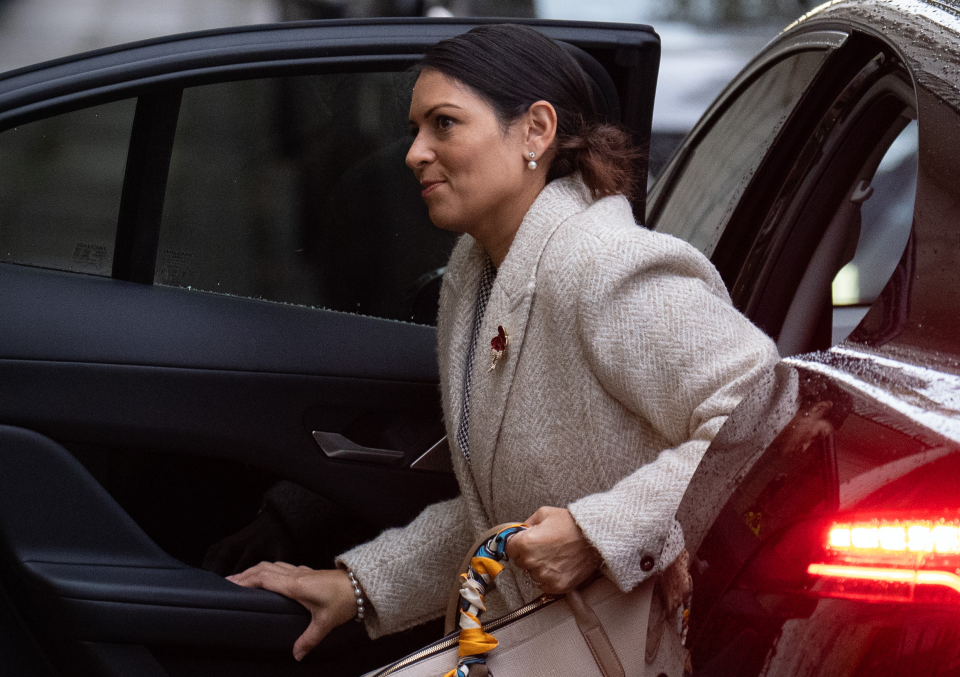
Just weeks into the first lockdown, on April 5, 2020, then-cabinet secretary Lord Mark Sedwill raised concerns with prime minister Boris Johnson about “heavy-handed enforcement by some police forces”, according to his witness statement to the inquiry.
On the issue of border controls, she reportedly told the Conservative Friends of India group in 2021: “On ‘should we have closed our borders earlier’ the answer is yes, I was an advocate of closing them last March.”
Other witnesses due at the inquiry on Thursday are Martin Hewitt, the former chairman of the National Police Chiefs’ Council and Jun Pang, policy and campaigns officer with human rights group Liberty.
Priti Patel to give evidence today
09:17 , Lydia Chantler-Hicks
Good morning, and welcome to The Standard's live blog.
We'll be bringing you updates from the UK Covid-19 Inquiry throughout today, as former home secretary Priti Patel is set to appear as a witness.
Former chair of the National Police Chiefs’ Council Martin Hewitt; and Jun Pang, of human rights organisation Liberty, are also due to give evidence.
Today's hearing is due to begin at 10am.
Follow along for everything you need to know.


